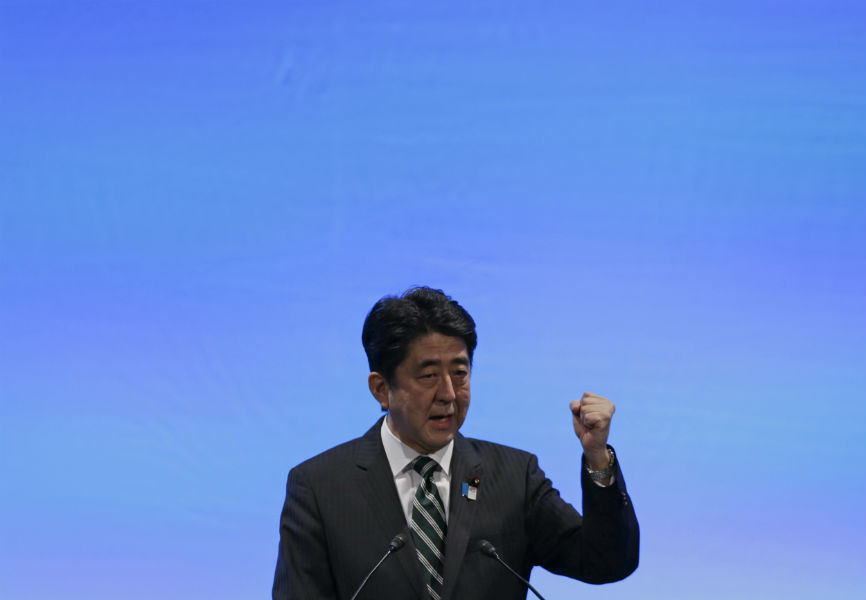Japan today is arguably better placed to expand its role on the global stage than at any time in its postwar history. This is largely thanks to the personal leadership of Prime Minister Shinzo Abe, who is serving an unprecedented third term as president of the ruling Liberal Democratic Party and will soon become the longest-serving prime minister in modern Japanese history.
Another factor of unusual continuity and stability for Japan is its monarchy, the world's oldest. It has been in the spotlight recently with the abdication of now-Emperor Emeritus Akihito and the end of the Heisei Era under his reign, paving the way for the enthronement of his son, Emperor Naruhito, and the new Reiwa Era. The Group of 20 meeting next month in Osaka and the Tokyo Olympics next year are two more events attracting international attention. The question is, what will Japan do with its global moment?
External factors have also helped to bring about this unique moment in Japanese history. The combination of strong leaders in China and Russia and a weak president in the United States—a consequence of deep divisions in US society—have helped open new opportunities for Japan. Given also the weakness of Britain's prime minister and Germany's chancellor, the decisions Japan makes on the global scene could not be more consequential for the future of the international order that has been in place since the end of World War II.
Following the arrival of US President Donald Trump, Japan has moved beyond being a passive beneficiary of the US security umbrella to assume a leadership role in Asia. It has struck a difficult balance between deepening its engagement in multilateral trade deals without the Americans, such as the Trans-Pacific Partnership and the Japan-EU trade deal, and starting negotiations with the US on a bilateral trade deal. Abe has focused the last two years on deepening his relationship with Trump, which has borne fruit, including Washington's wholesale adoption of Abe's “Free and Open Indo-Pacific” initiative. Trump rhetorically abandoned the Obama administration's “pivot to Asia” strategy and embraced Tokyo's regional vision instead. Japan is positioning itself to chart the future of the bilateral alliance on a global scale—not just in the Indo-Pacific but also in Eurasia, in geo-technology and beyond—and as more than just a junior partner.
As the leader with the most stable and solid political base among the major democratic powers, Abe has a unique status. While other Western leaders are facing a populist backlash to their authority, Abe has emerged on the global geopolitical landscape as both a champion of Japanese national interests and of the liberal international order.
However, this does not mean that Japan is immune to a difficult geopolitical neighborhood that includes the challenges posed by China, North Korea, and Russia. As the Trump administration hardens its “America First” approach in the run-up to the 2020 presidential election, Japan is balancing its relations with its neighbors and with the US—as shown by ongoing discussions and progress on tariffs and trade deals.
If the last two years have been about Japan adjusting to America's new style of global leadership, 2019–2020 will provide opportunities for Japan to both act as a regional leader and as a convener of the rules-based international order (as Abe declared at this year's conference of the World Economic Forum in Davos, Switzerland, in relation to data governance).
Japan seems to be virtually the only country both willing and able to fend off revisionist challenges. Abe is one of the few world leaders who can talk and mediate on behalf of Washington, Moscow, Ankara, Jerusalem, Riyadh, and Tehran (among the many other capitals where he has friends) without the threat of domestic backlash. As a result, Japan's role as a global bridge-builder facilitating dialogue between international order and revisionist forces has never been more necessary. Of course, Tokyo cannot succeed on its own, but as a convener of like-minded nations and leaders, Japan has a historic opportunity in its global moment.
Navigating its own internal demographic decline and managing its economy will be critical both domestically but also internationally, given Japan's new global responsibilities. As an isolated island nation, Japan in the past could simply ignore many of the trends shaping the world. But now it finds itself on the front lines of an increasingly leaderless “G-Zero World.”
Without any natural resources of its own, Japan's destiny will be more globally and technologically driven. The Japanese will be forced to look beyond their islands as they commit to bolstering the existing global order—not just to the open seas that guarantee trade but in new realms such as cybersecurity and data flows. Which is why Eurasia Group organized its first G-Zero Summit in Tokyo and is committed to holding this forum every year to bring the world to Japan to analyze the latest trends in geopolitics, geoeconomics, and geotechnology. Japan's global moment is upon us.
This article originally appeared in The Japan Times.

 Japanese Prime Minister Shinzo Abe. REUTERS.
Japanese Prime Minister Shinzo Abe. REUTERS.
